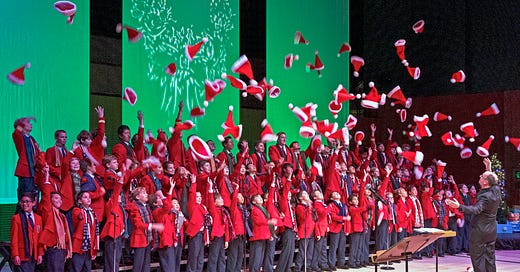What Boy Sopranos Can Teach Us About Masculinity
An age-old Christmas tradition offers insights for a current moment
Photo Credit: The All-American Boys Chorus, Santa Ana, CA
The Christmas story is dramatized in religious ceremonies worldwide throughout December, but perhaps nowhere more visibly than the Christmas Eve service at King’s College in Cambridge. Broadcast worldwide by the BBC, the beloved Festival of Nine Lessons and Carols has persevered for more than a century. Every year, the program starts with a lone boy soprano chosen from the all-male chapel choir to sing the first verse of “Once in Royal David’s City.”
Like millions of others, I look forward to this service every Christmas. But I expect it to feel somewhat different this year, when the discourse about the challenges afflicting men and masculinity has shifted from a simmer of concern to a rapid boil of alarm.
After studying boy choirs for the past several years for a forthcoming book I’ve written on the subject, I’m more convinced than ever that the age-old institution of the boys-only choir offers a surprisingly apt metaphor for understanding the current dilemmas we face regarding the intersection of male privilege and male vulnerability.
On one hand, all-male institutions like boys-only choirs are increasingly scrutinized – and rightly so – because the opportunities they offer have been disproportionately made available to boys and men rather than girls and women. Like most forms of gender inequality, these groups were originally justified through appeals to biological understandings of sexual difference. Because their voices drop during puberty, boys have a limited window for singing soprano notes, and these singers – known as “unchanged trebles” in the choral world – once offered higher pitches in church choirs that refused entry to women.
But while their historical raison d’etre has slowly evaporated, boy choirs now speak to the social needs of boys in a rapidly changing society that eschews toxic masculinity but has yet to offer boys many alternatives to replace it. Many boys initially see singing as a feminine pursuit in a culture of compulsory masculinity, in which boys learn early on to refrain from showing their emotions in public. Boys-only choirs help maintain a tradition devoted to male singing, something that many boys say they are too embarrassed to do around same-age female peers.
Although their practices are often decidedly conservative, the boy choir directors I interviewed approach their work with a surprisingly progressive understanding of what it means to be a 21st-century man. They emphasize traditional values like discipline, respect, and politeness, while also teaching young singers to express a range of emotions – feelings like joy, sadness, fear, longing. They also give boys a safe space in which to critique hyper-masculinity. As one director told me, “My goal is that none of the boys in my choir grow up to be assholes.”
Because it is oriented around the impending voice change, the boy choir tradition also explicitly acknowledges the ways in which becoming a man implies a form of loss for boys. After being valued for their rigorous soprano training, many of the former choristers I interviewed remember their voice change with a painful, wrenching sadness. One recalled his experience as “devastating,” saying “I knew that I lost this precious thing that I couldn’t get back.” This grief wasn’t just about the loss of their soprano register, it also acknowledged the rigid, socially-constrained expectations of manhood that awaited them, a litany of deprivation that we can recognize all too well: an expectation that they would be tough, cut off from their emotions, and by extension unable to seek intimacy and social connection openly.
This explains why most of the current boy choral directors that I interviewed now see the justification for their existence somewhat differently than their predecessors did centuries ago – not about excluding girls from opportunities or nurturing an allegedly other-worldly vocal sound, but instead about preserving boys’ ability to show their feelings and stay connected to their emotional lives. In an era where young men increasingly struggle with social isolation and emotional disconnection, this seems a far more urgent project.
We have much work ahead of us to find effective ways to address these challenges for boys and men. But in this advent season of waiting, when the unchanged voices of boys will yet again fill the airwaves today, this ancient ritual shows us how an otherwise conservative tradition has long recognized and celebrated broader possibilities for men. We should listen.





Interesting perspective …”preserving boys’ ability to show their feelings and stay connected to their emotional lives.” We could use a little more of this in our society …
Thanks for this insight, Rebecca. I appreciate it and am looking forward to thinking of you as we listen to the radio in a few hours. Merry Christmas!